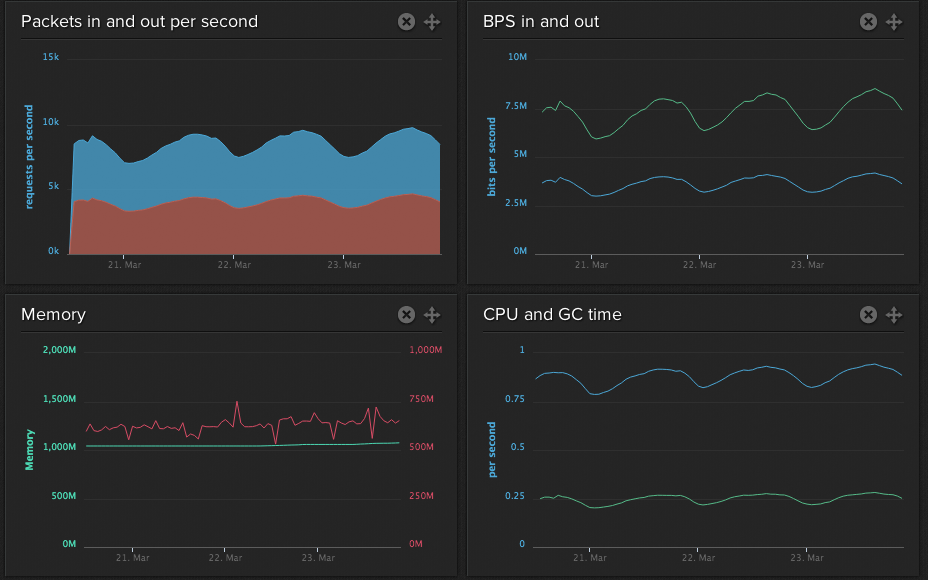 Documentation
¶
Documentation
¶
Index ¶
Examples ¶
Constants ¶
This section is empty.
Variables ¶
var DefaultConfig = NewConfig()
Functions ¶
func DecodePeerAddress ¶
DecodePeerAddress transforms the binary-encoded host:port address into a human-readable format. So, "abcdef" becomes 97.98.99.100:25958.
func RegisterFlags ¶
func RegisterFlags(c *Config)
Registers Config fields as command line flags. If c is nil, DefaultConfig is used.
Types ¶
type Config ¶
type Config struct {
// IP Address to listen on. If left blank, one is chosen automatically.
Address string
// UDP port the DHT node should listen on. If zero, it picks a random port.
Port int
// Number of peers that DHT will try to find for each infohash being searched. This might
// later be moved to a per-infohash option. Default value: 5.
NumTargetPeers int
// Comma separated list of DHT routers used for bootstrapping the network.
DHTRouters string
// Maximum number of nodes to store in the routing table. Default value: 100.
MaxNodes int
// How often to ping nodes in the network to see if they are reachable. Default value: 15 min.
CleanupPeriod time.Duration
// If true, the node will read the routing table from disk on startup and save routing
// table snapshots on disk every few minutes. Default value: true.
SaveRoutingTable bool
// How often to save the routing table to disk. Default value: 5 minutes.
SavePeriod time.Duration
// Maximum packets per second to be processed. Disabled if negative. Default value: 100.
RateLimit int64
// MaxInfoHashes is the limit of number of infohashes for which we should keep a peer list.
// If this and MaxInfoHashPeers are unchanged, it should consume around 25 MB of RAM. Larger
// values help keeping the DHT network healthy. Default value: 2048.
MaxInfoHashes int
// MaxInfoHashPeers is the limit of number of peers to be tracked for each infohash. A
// single peer contact typically consumes 6 bytes. Default value: 256.
MaxInfoHashPeers int
// ClientPerMinuteLimit protects against spammy clients. Ignore their requests if exceeded
// this number of packets per minute. Default value: 50.
ClientPerMinuteLimit int
// ThrottlerTrackedClients is the number of hosts the client throttler remembers. An LRU is used to
// track the most interesting ones. Default value: 1000.
ThrottlerTrackedClients int64
//Protocol for UDP connections, udp4= IPv4, udp6 = IPv6
UDPProto string
}
Config for the DHT Node. Use NewConfig to create a configuration with default values.
type DHT ¶
type DHT struct {
Logger Logger
// Public channels:
PeersRequestResults chan map[InfoHash][]string // key = infohash, v = slice of peers.
// contains filtered or unexported fields
}
DHT should be created by New(). It provides DHT features to a torrent client, such as finding new peers for torrent downloads without requiring a tracker.
Example ¶
ExampleDHT is a simple example that searches for a particular infohash and exits when it finds any peers. A stand-alone version can be found in the examples/ directory.
if testing.Short() {
fmt.Println("Peer found for the requested infohash or the test was skipped")
return
}
d, err := New(nil)
if err != nil {
fmt.Println(err)
return
}
go d.Run()
infoHash, err := DecodeInfoHash("d1c5676ae7ac98e8b19f63565905105e3c4c37a2")
if err != nil {
fmt.Printf("DecodeInfoHash faiure: %v", err)
return
}
tick := time.Tick(time.Second)
var infoHashPeers map[InfoHash][]string
M:
for {
select {
case <-tick:
// Repeat the request until a result appears, querying nodes that haven't been
// consulted before and finding close-by candidates for the infohash.
d.PeersRequest(string(infoHash), false)
case infoHashPeers = <-d.PeersRequestResults:
break M
case <-time.After(30 * time.Second):
fmt.Printf("Could not find new peers: timed out")
return
}
}
for ih, peers := range infoHashPeers {
if len(peers) > 0 {
// Peers are encoded in binary format. Decoding example using github.com/nictuku/nettools:
//for _, peer := range peers {
// fmt.Println(DecodePeerAddress(peer))
//}
if fmt.Sprintf("%x", ih) == "d1c5676ae7ac98e8b19f63565905105e3c4c37a2" {
fmt.Println("Peer found for the requested infohash or the test was skipped")
return
}
}
}
Output: Peer found for the requested infohash or the test was skipped
func New ¶
New creates a DHT node. If config is nil, DefaultConfig will be used. Changing the config after calling this function has no effect.
This method replaces NewDHTNode.
func (*DHT) AddNode ¶
AddNode informs the DHT of a new node it should add to its routing table. addr is a string containing the target node's "host:port" UDP address.
func (*DHT) PeersRequest ¶
PeersRequest asks the DHT to search for more peers for the infoHash provided. announce should be true if the connected peer is actively downloading this infohash, which is normally the case - unless this DHT node is just a router that doesn't downloads torrents.
func (*DHT) Port ¶
Port returns the port number assigned to the DHT. This is useful when when initialising the DHT with port 0, i.e. automatic port assignment, in order to retrieve the actual port number used.
type InfoHash ¶
type InfoHash string
func DecodeInfoHash ¶
DecodeInfoHash transforms a hex-encoded 20-characters string to a binary infohash.
 Source Files
¶
Source Files
¶
 Directories
¶
Directories
¶
| Path | Synopsis |
|---|---|
|
examples
|
|
|
find_infohash_and_wait
Runs a node on a random UDP port that attempts to collect 10 peers for an infohash, then keeps running as a passive DHT node.
|
Runs a node on a random UDP port that attempts to collect 10 peers for an infohash, then keeps running as a passive DHT node. |

